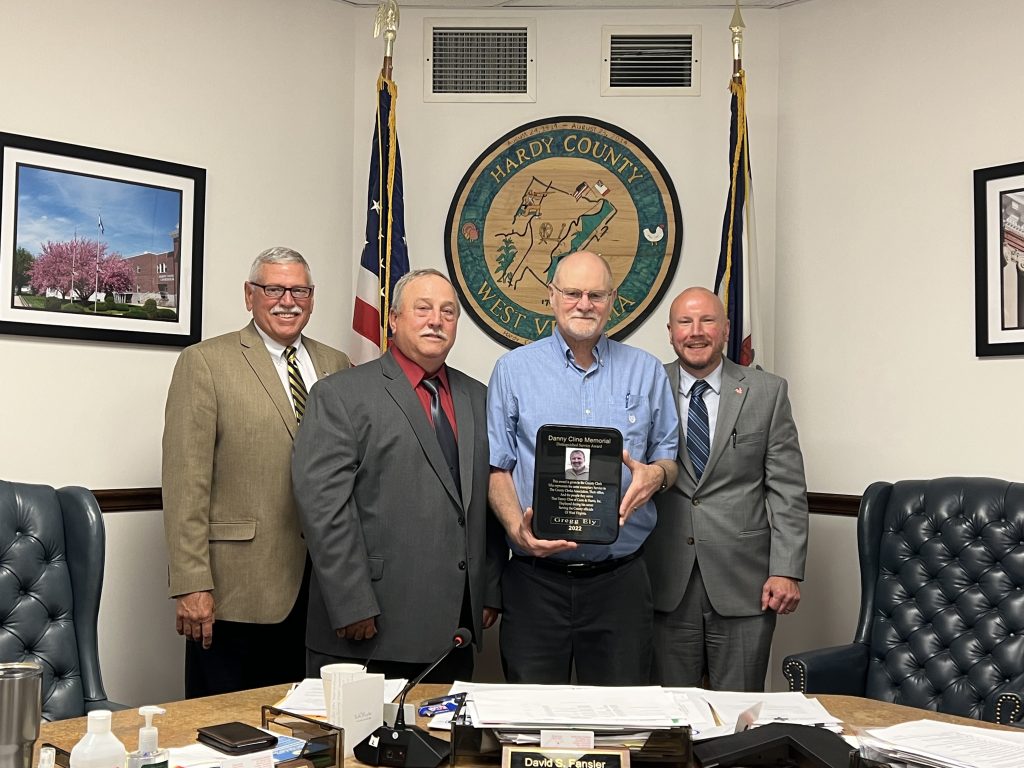By Hannah Heishman, Moorefield Examiner
Attorney Wendy Greve explained, in detail, the County Commission’s authority related to other elected officials and their offices.
Greve, from Charleston firm Pullin, Fowler, Flanagan, Brown & Poe, PLLC, appeared by request of the Commission at their regular meeting Sept. 6, 2022.
County Prosecuting Attorney Lucas See has been accused of sexual assault and harassment by two employees. The employees were placed on paid administrative leave, but See has continued to work.
Additionally, Sheriff Steve Dawson and Deputy Tommie McCausley are both involved in a lawsuit that includes the County Commission.
McCausley allegedly inappropriately accessed images of minors through work computers, and Dawson has allegedly protected him while firing the individual who brought the situation to light.
Questions arose from the public about why the Commission has apparently done little or nothing to affect either situation.
“People look for an authority,” said Commissioner Steven Schetrom, “In a democracy, you don’t have these. We all have lanes.”
Greve agreed. “You are not the boss of other officials,” she said, clarifying the Commission has no supervisory role or power over other offices or employees other than their own.
“The voters vote for, and elect officials,” she said. “If the Commission could direct what they did, it takes away the voters’ rights.”
Greve went on to explain that the County Commission keeps the pocketbook: “It is your job to ensure each office has the money they need to function.”
She noted that the Commission can’t, for example, deny hiring an individual unless there is a constitutional issue, such as nepotism.
“The County Commission can’t place any employee on leave, except a County Commission employee,” she said.
Greve said it is the W.Va. Legislature’s job to, “determine who can do what.”
She referred to W.Va. Code §6-6-7, “Procedure for removal of county, school district and municipal officers having fixed terms; appeal; grounds; cost,” in particular the following (http://www.wvlegislature.gov/WVCode/Code.cfm?chap=06&art=6):
(1) In the case of any county officer, member of a board of education or magistrate:
(A) By a duly enacted resolution of the county commission which sets forth therein the name and office of the challenged officer, the alleged wrongful acts, the dates the alleged acts occurred and the grounds for removal as provided in this article;
and
(C) By petition of a number of qualified petitioners, which number shall be:
(ii) In a county with a population in excess of ten thousand but not in excess of fifty thousand, the lesser of five hundred or ten percent of the number of registered voters who participated in the particular election in which the challenged officer was chosen which next preceded the filing of the petition
Such petition shall set forth therein the name and office of the challenged officer, the alleged wrongful acts and the grounds for removal.
Per the 2020 census, Hardy County has 13,789 people. Not all are voters, and not all voters voted in the applicable elections. See and Dawson were either re-elected or elected in 2020.
The above code means there are two ways to remove an elected official; the Commission does have an option, but so does the voting public.
If either a Commission resolution or a voters’ petition is presented, the next step is the circuit court. If the circuit court judge finds cause to move forward, it goes to the W.Va. Supreme Court of Appeals.
The Supreme Court of Appeals creates a three-judge panel from circuit court judges across the state; no more than one may be from the circuit originating the filing.
Greve reiterated, “There is no democracy if voters elect someone, and the (County) Commission removes them.”
She said that for the County Commission to act, they need information, but it cannot be based on rumor.
“All you have are allegations and a lawsuit,” Greve said.
Greve also mentioned cost to taxpayers, regardless of route, although she provided no numbers.
Attempts to assemble a petition this past Spring stalled, partially due to stated fears of retaliation against those who sign. Allegedly, another attempt is ongoing.
She also mentioned a situation elsewhere in the state where an elected official was tried for a crime, convicted, and incarcerated, and only then was removed from office.
OpenGov.com
Commissioners also received a brief from JB McCuskey, the State Auditor, and Skylar Wotring, his Director of Transparency and Oversight, about OpenGov.com. McCuskey appeared remotely via Teams.
OpenGov.com is a transparency program used by counties and municipalities to make financial data easily accessible to the public. Hardy and Hampshire Counties are the only counties in the Eastern Panhandle not participating.
It’s a voluntary program, and allows governments to make better decisions, McCuskey said.
“The system works, and it works well,” he added.
McCuskey said OpenGov gives Commissioners a specific window into finances, providing decision makers clearer understanding. It offers the public and media immediate access to what the government is doing, which helps rebuild trust.
Finally, it includes stories. “It tells the story of what you’re doing with constituents’ money,” he said. Governments can pull reports for specific projects, and add photos.
“It’s one thing to do something,” McCuskey said. “(It’s) another to show it, and a third to show details.”
He then tied using the program back to Amendment 2, on the ballot for voters this fall. The Amendment, if approved, would cut personal property taxes, with the Legislature’s assurance the money would be made up for elsewhere. The Hardy County Commission opposes the amendment, as do many others across the state.
McCuskey said there is, “an information divide,” in that now, it’s hard for voters to see where money comes from, and how it’s spent.
Wotring explained that most of the work is done on their end, and not by the county or municipal government.
All of it is completely free, with no contract; McCuskey believes in it enough that the State government is paying, “so no one else does.”
“You will own this site. We pay for it, you own it,” the Auditor said. “All of it is private until it’s public; we’ll make sure it looks exactly like you want it.”
Wotring added, “We can take as long as you need to feel comfortable.”
“With CARES and ARP, we’ve been handling sums of money heretofore unknown,” Commissioner David Workman said. “It would be good for us, and good for the public.”
The discussion closed without a decision. Wotring said he will call and follow up with the Commissioners.
COVID-19
Hardy County Health Department administrator Bill Ours received notice of the county’s third death this month from COVID just as he began briefing.
Ours said the latest booster is specifically directed at mutations Omicron 4 and Omicron 5, and fully encouraged the public to get it. He said nursing homes would get it, first.
“If you have health issues, it can be really bad,” Ours said.
He reported, as he has before, that the number of active cases is unknown, since most people test at home and aren’t counted unless they see a medical professional. He said the county averages two to three people hospitalized per week.
“We gotta help ourselves a little bit,” Ours said.
He reported the county’s first case of monkeypox, and said he has the vaccine, as well as screening. Those interested in receiving the vaccine should call the Health Department at 304-530-6355.
E9-1-1
Paul Lewis told the Commission the county still has communications issues and requires antennae for towers. The main problems are on Charlie’s Knob and Helmick Rock; they’ll be replaced as soon as the antennae come in.
In August the 9-1-1 Center handled 730 calls.
The Department of Natural Resources had 13 calls; the Sheriff’s Office had 283; Moorefield Police Department had 292; and the State Police had 29.
West Hardy Ambulance Service had 106 calls, Hardy County Emergency Ambulance Authority had 75, and Wardensville Rescue had 28. Lewis noted there’d been “many falls.”
Mathias/Baker Volunteer Fire Department had 27 calls, Moorefield VFD had 9, and Capon Valley VFD had six.
Lewis said dispatchers called the Department of Highways 17 times, mostly for downed trees.
Lewis said he’d heard from the state on four submitted grant applications; three were not approved. He hasn’t heard about the fourth, which would acquire equipment for the Lost City Tower.
Other
The Commission entered an Executive Session early in the meeting to meet with lawyers from Mullins and Mullins regarding the opioid settlements and other issues. Following, Commissioners approved signing to participate in the settlement.
They approved HCEAA’s monthly request for $65,000.
Sheriff Steve Dawson reported coming in two percent under budget. He said his office had been “really busy,” and received two new cruisers.
He reported the Drug Task Force has been very busy: “They’re going to make a difference in this county.”
Commissioners scheduled a work session for Sept. 20 at 2 p.m.
Stephen G. Smith, representing Hardy County Republicans, sought additional information about testing the systems for the upcoming election. Clerk Gregg Ely advised him that online training videos are available, and that Ely will do a live training session for poll workers.
Smith asked about voting machine testing. Ely said he won’t have the data he needs until the end of September, and plans to conduct the tests in October.
Bob Taylor and Anthony Rao, representing Hardy County Parks and Recreation, requested $62,500 to cover overruns at the Brighton Park construction project; they’re building a shelter with food preparation area and bathrooms. The Commission approved the request.
Citizens who live just outside the Moorefield Corporate tax district raised an issue with Assessor Jim Wratchford. Their personal property paperwork placed them incorrectly in the Moorefield Corporate district, which resulted in higher taxes.
Commissioner David “Jay” Fansler requested time to look into the matter. Commissioners noted that once citizens sign tax paperwork, they’re indicating everything on it is correct.
The next regular meeting is Tuesday, Oct. 4 at 9 a.m. at the Hardy County Courthouse. The public is encouraged to attend.

